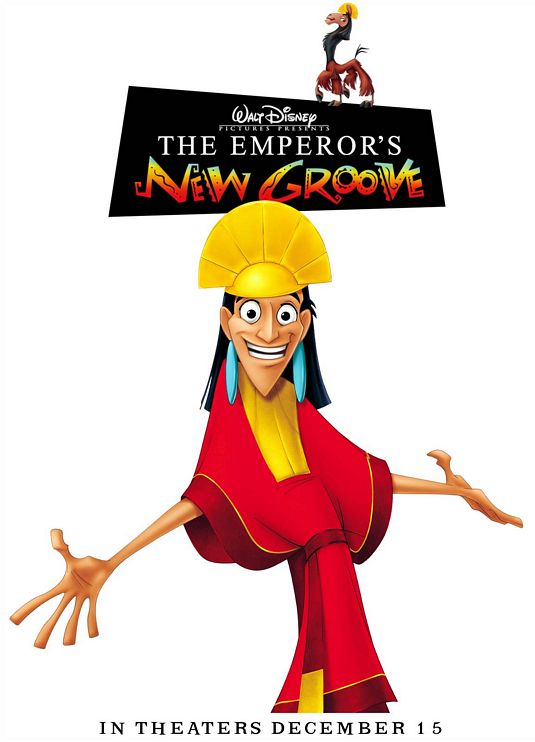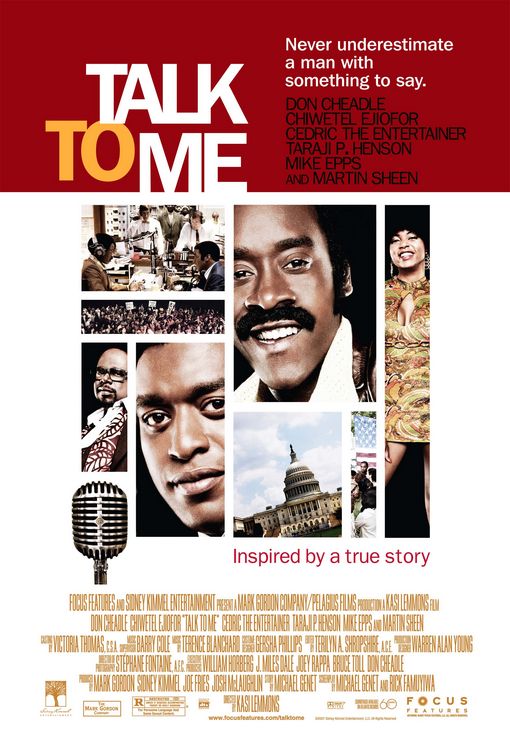“Lively Entertainment, Shallow Ideology, Obscene Language”

| None | Light | Moderate | Heavy | |
|---|---|---|---|---|
| Language | ||||
| Violence | ||||
| Sex | ||||
| Nudity |
What You Need To Know:
TALK TO ME is lively, funny and dramatic, but the second half drags a little. Cheadle is excellent as Petey, but Taraji P. Henson almost steals the show, as Petey’s caring girlfriend. The movie handles the racial tensions of the 1960s from a liberal viewpoint. This means that the movie also contains lots of foul language, and some off-color humor and sexual elements.
Content:
(H, PCPC, C, B, Pa, LLL, VV, SS, N, AA, DD, M) Light humanist worldview from a strong liberal perspective about the social and racial tensions of the 1960s, plus some light Christian and moral elements, especially regarding the movie’s attack on racism and its powerful scenes where a liberal deejay helps calm the nation’s capitol when riots and looting break out in the wake of the assassination of Civil Rights leader Martin Luther King, mitigated by some paganism leading to a free use of foul language and some sexual libertinism, which always seem to accompany atheist humanism and what passes for liberalism during and after the 1960s; at least 134 obscenities (including many “f” words), 16 strong profanities, five light profanities, and drunken man in two scenes vomits and nervous man vomits in another scene; some strong scenes of violent riots and some violent arguments; brief scene of depicted fornication, implied fornication and some off-color remarks; upper and rear male nudity, plus some female cleavage; alcohol use and drunkenness; smoking and light drug references; and, employee disobeys boss, friends have a falling out, looting rebuked, cheating, and man shows up late for concert he’s supposed to introduce.
More Detail:
Don Cheadle stars in the movie as fast-talking ex-convict Ralph Waldo “Petey” Greene. Having met him in prison before Petey got out, Petey (with his boisterous girlfriend) approaches Dewey Hughes (played by Chiwetel Ejiofor), just promoted to Program Manager of WOL-AM, for a job.
Petey’s outgoing, sometimes annoying and obnoxious, attitude offends the white station owner and upsets Dewey. Later, however, Dewey challenges Petey at the pool room where Petey hangs out. Dewey recognizes Petey’s talent for public speaking, comedy and inspiring his black brothers and sisters. Against the station owner’s wishes, they cook up a scheme to give Petey a chance to show the audience he can attract. The scheme works, and Petey becomes the morning talk show host of a program where Petey raps in street lingo to the African American community about the day’s issues, from a liberal perspective.
Petey and Dewey become close friends. Dewey even becomes Petey’s personal manager. When, however, Dewey pushes Petey into doing television and standup comedy, Petey becomes depressed, starts drinking even more heavily and eventually rebels against Dewey’s more conservative notions of success and fame.
TALK TO ME is lively, funny and dramatic. What it lacks in profundity, it makes up for in entertainment, though the movie’s second half is slow and strained in parts. Also, the script does not always seem clear as to the root causes behind Petey’s objections to the way in which Dewey is managing Petey’s career. Despite these problems, Cheadle and Ejiofor are excellent as Petey and Dewey, and Taraji P. Henson almost steals the show, as Petey’s boisterous but caring girlfriend.
The movie handles the racial and social tensions of the 1960s from a liberal viewpoint. This also means that the movie contains lots of foul language (more than 150 obscenities and profanities), some off-color humor, and some sexual immorality (funny how so many liberal movies, especially ones with a secular perspective, have so much foul language and sexual immorality, as if they are trying to go out of their way to attack biblical values and Christian virtues).
The scenes surrounding the assassination of Civil Rights leader Martin Luther King in 1968 are powerful and emotional, but the movie doesn’t reveal the radical socialist beliefs that Dr. King eventually developed in his search for “social justice.” Thus, as with most movies from a liberal political perspective, TALK TO ME doesn’t deal with the real socio-political issues seriously. Consequently, the movie paradoxically abandons its own theme of “telling it like it is” for the typically shallow, and ultimately narrow and feebleminded, political ideology of the left.
Of course, if your political, philosophical or theological ideology blinds you to Truth, you become part of the problem, not the solution. Ultimately, only the Gospel of Jesus Christ and a traditional Christian approach to God’s Infallible Word, the Bible, can set you free from all political, philosophical and theological illusions. When that happens, you can then truly proclaim (to paraphrase Dr. King when he famously quoted a Christian Negro spiritual), “Free at last! Free at last! Thank God Almighty, I am free at last!”


 - Content:
- Content: 




